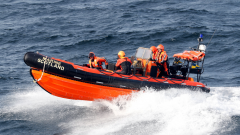Managing the human activities that have an impact on Scotland’s seas
Scotland’s vision is for ‘clean, healthy, safe, productive, biologically diverse marine and coastal environments, managed to meet the long-term needs of people and nature’. Achieving the vision requires that the Scottish Government and its associated public sector partners work together in terms of the provision of evidence and advice on managing the seas.
With responsibility for about 6 times as much sea area as land area, the need for evidence is substantial and requires that government organisations work closely with their partners, the academic community and wider stakeholders as well as contributing to the UK and international networks. This is especially important given the mobile nature of the ocean and the migrations undertaken on an annual basis by many marine species.
This section briefly describes the various bodies that provide the required evidence in support of the vision and the delivery of the National Marine Plan. The Scottish management infrastructure is highlighted as too is the UK and international infrastructure to which Scottish organisations have access and provide input. Some of the large projects which have made a significant contribution to the knowledge of marine systems since the Marine Atlas was published in 2011 are described.
Marine Scotland is responsible for the integrated management of Scotland's seas for the Exclusive Economic Zone (EEZ) adjacent to Scotland. In liaison with other bodies: SEPA, NatureScot, JNCC, Crown Estate Scotland and others, Marine Scotland carries out its responsibilities under the key legislation of the Marine (Scotland) Act 2010 and the Marine and Coastal Access Act 2009.
The key document for managing the human activities having an impact on Scotland’s seas is the first National Marine Plan published in 2015. This provides general and sectoral policy for the management of the Scottish Inshore and Offshore Regions (statutory areas defined in the Marine and Coastal Access Act 2009). It also provides the context for statutory regional planning that will be undertaken by eleven Marine Planning Partnerships (MPPs) for the eleven statutory Scottish Marine Regions (SMRs). Clyde MPP was established in 2016 and Shetland MPP in 2016. The National Marine Plan Review 2018: three-year report, required under the enabling legislation, was published in March 2018. The next NMP review is due in 2021. Scotland's Marine Assessment 2020 will inform that review.





